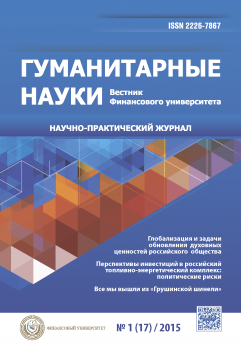The past year (2014) adjusted Russian foreign policy and once again raised the need to shift towards cooperation with the East. The relevance of this article is examination of international activity of the Russian authorities during sensitive geopolitical and economic turbulence and unprecedented pressure on Russia since the collapse of the bipolar system of international relations. The goal is to identify advantages and disadvantages of the «turn to the East» strategy that was proclaimed by the Russian officials in 2014. The following tasks should be solved to achieve this goal: systematization of Russian political and business elites’ activity in the East, analysis of the steps Russia has already taken, fixing of the political and economic risks that Russia may face in the East on a midterm horizon. Assessment of the effectiveness of Russian leaders’ foreign policy maneuvers in the East requires the following methods: event analysis, situational analysis and the method of peer review. The general conclusion of the paper is the statement that the Russian turn to the East has not formed yet and it requires systematization and formation of an integrated strategy. The author plans to continue to study Russian political and economic potential in the East as well as to identify problem fields and their solutions.
foreign policy, East, India, China, foreign relations, sanctions, Turkey.
Проблема выбора вектора внешнеполитического развития России остро встала перед руководством страны в 2014 г., несмотря на то, что и ранее предпринимались попытки заменить евроатлантический трек альтернативными направлениями. В разные периоды времени в фокусе российского руководства находились Латинская Америка и даже Африка. Однако наиболее реалистичным с точки зрения формирования равноценной альтернативы, способной компенсировать материальные и имиджевые издержки, понесенные Россией в результате санкционного давления и попыток элит ряда западных стран выдерживать «дипломатический бойкот», выглядит азиатское направление, особенно Азиатско-Тихоокеанский регион (АТР).
Если ранее российское руководство предпринимало отдельные шаги по выстраиванию более тесных отношений с партнерами на Востоке, теперь делает заявку на формирование системного подхода к взаимоотношениям со странами Азии. Фактически, разворот страны на Восток — новая парадигма российской внешней политики, принцип построения отношений обновленной России с партнерами. В феврале 2015 г. министр иностранных дел Сергей Лавров назвал сближение России с Востоком «национальным приоритетом на весь XXI век» [1].
1. Sergey Lavrov vystupil pered slushatelyami Dipakademii MID Rossii 27 fevralya 2015 goda [Sergey Lavrov addressed the students of the Diplomatic Academy under the Russian Ministry of Foreign Affairs 27 February 2015]. Avialable at: http://russian.rt.com/article/76666 (Accessed 4 March 2015).
2. Petrovskiy V.E. Uchastie v rabote institutov global’nogo upravleniya i ikh reformirovanii: sravnitel’nyy analiz opyta Rossii i Kitaya [Participation in global government institutions: comparative analyses of the Russian and Chines practices]. Kitay v mirovoy i regional’noy politike: Istoriya i sovremennost’. [China in the global and regional policy: History and modernity]. Far East Institute under the Russian Academy of Science Publ. 2014. I. 1, pp. 104-120.
3. MID Kitaya: Ob”em torgovli mezhdu KNR i RF sostavit 100 mlrd dollarov [Ministry of Foreign Affairs of China: trade volume will reach $100 bln]. Rossiyskaya gazeta [Russian newspaper]. Avialable at: http://www.rg.ru/2015/03/08/torgovlya-anons.html (Accessed 10 March 2015).
4. Natsional’nyy bank Respubliki Kazakhstan [National Bank of the Republic of Kazakhstan]. Avialable at: http://www.nationalbank.kz/?docid=680&;switch=russian (Accessed 4 March 2015).
5. Natsional’nyy statisticheskiy komitet Kyrgyzskoy Respubliki [National Committee of Statistics of the Kyrgyz Republic]. Avialable at: http://stat.kg/index.php?option=com_content&;task=view&id=31&Itemid=101 (Accessed 4 March 2015).
6. De Kremer, D. Kak zapadnomu biznesmenu zavoevat’ doverie kitayskikh partnerov [How a western businessman can gain trust of Chines partners]. Avialable at: http://hbr-russia.ru/liderstvo/delovye-svyazi/p15421/# (Accessed 4 March 2015).
7. Vizit Putina v Indiyu prines kontrakty «Rosnefti» i «Rosatomu» [Visit of Vladimir Putin to India brought contracts to «Rosneft`» and «Rosatom»]. Avialable at: http://top.rbc.ru/politics/11/12/2014/5489b7612ae5961a5ec4f573 (Accessed 4 March 2015).
8. Lebedeva N.B. Tikhookeanskiy vek Ameriki - na povestke dnya snova voennye bazy [The Pacific century of America: military bases are on top again]. Voyna i mir: internet-sayt [War and Peace: web-site]. Avialable at: http://www.warandpeace.ru/ru/analysis/view/68771 (Accessed 10 March 2015).
9. Berger Ya. Natsionalizm i vneshnyaya politika KNR [Nationalism and foreign policy of China]. Rossiyskiy sovet po mezhdunarodnym delam [Russian international Affairs Council]. Avialable at: http://russiancouncil.ru/inner/?id_4=5020#top (Accessed 4 March 2015).
10. Davydov A.S. Kitaysko-amerikanskie otnosheniya «novogo tipa» i faktor Rossii v global’nom i regional’nom izmereniyakh [Sino-American relations of a “new type» and Russian factor in global and regional measurement]. Kitay v mirovoy i regional’noy politike: Istoriya i sovremennost’ [China in global and regional policy: History and modernity]. Far East Institute under the Russian Academy of Science Publ. . 2014. I. 19. pp. 121-134.





